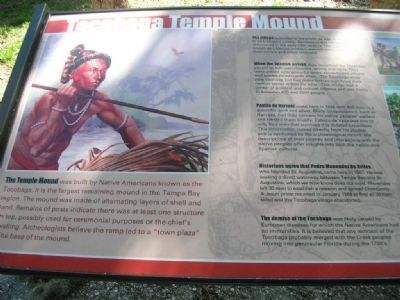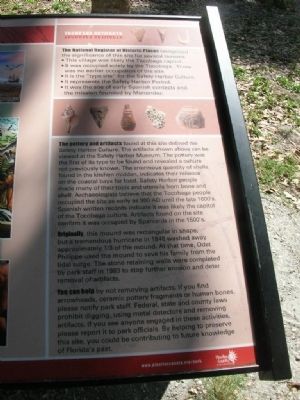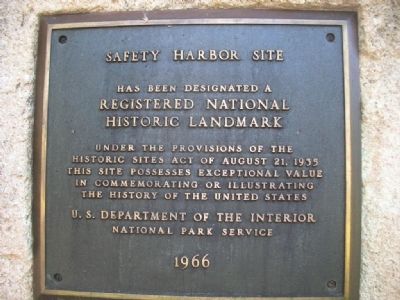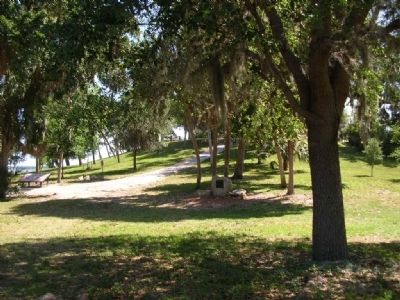Safety Harbor in Pinellas County, Florida — The American South (South Atlantic)
Safety Harbor Site
Registered National
Historic Landmark
under the provisions of the
Historic Sites Act of August 21, 1935
This site possesses exceptional value
in commemorating or illustrating
the history of the United States
Erected 1966 by U. S. Department of the Interior, National Park Service.
Topics and series. This historical marker is listed in these topic lists: Anthropology & Archaeology • Landmarks • Native Americans • Notable Places • Settlements & Settlers. In addition, it is included in the National Historic Landmarks series list. A significant historical year for this entry is 1935.
Location. 28° 0.521′ N, 82° 40.675′ W. Marker is in Safety Harbor, Florida, in Pinellas County. Marker is on Philppe Park Road, on the right when traveling south. Archaeological site at water's edge at the southeast tip of Philippe Park. Touch for map. Marker is in this post office area: Safety Harbor FL 34695, United States of America. Touch for directions.
Other nearby markers. At least 8 other markers are within 2 miles of this marker, measured as the crow flies. Tocobaga Temple Mound (a few steps from this marker); Philippe Park (about 500 feet away, measured in a direct line); Odet Philippe (about 600 feet away); Bahia Espiritu Santo Mission (about 800 feet away); Espiritu Santo Church (approx. half a mile away); Safety Harbor Historical Site: Tucker Mansion (approx. 1.2 miles away); Safety Harbor Historical Event: Peace Treaty Between the Tocobaga and the Calusa (approx. 1.2 miles away); Safety Harbor Historical Site: Safety Harbor School (approx. 1.3 miles away). Touch for a list and map of all markers in Safety Harbor.
More about this marker. Largest remaining Indian Mound in the Tampa Bay area, although 1/3 of it was washed away in an 1848 hurricane.
Regarding Safety Harbor Site. Nearby interpretive display board.
Also see . . .
1. Tocobago. (Submitted on November 19, 2008, by Julie Szabo of Oldsmar, Florida.)
2. Archaeological sites in Florida. (Submitted on November 19, 2008, by Julie Szabo of Oldsmar, Florida.)
Additional keywords. Indian mound, Tocobaga

Photographed By Julie Szabo, April 17, 2008
3. Tocobaga Temple Mound Information Board, left portion
Tocobaga Temple Mound
The Temple Mound was built by Native Americans known as the Tocobaga. It is the largest remaining mound in the Tampa Bay region. The mound was made of alternating layers of shell and sand. Remains of posts indicate there was at least on structure on top, possibly used for ceremonial purposes or the chief’s dwelling. Archeologists believe the ramp led to a “town plaza” at the base of the mound.
The village extended to the south, as well as to the … in an L-shaped pattern. Remains of this village were discovered in the early 20th century. The trash here, known as a kitchen midden, also left many clues to their culture and social structure.
When the Spanish arrived, they described the Tocobaga people as tall, well-muscled, strong and agile. They were armed with powerful bows, stone-tipped arrows and and spears thrown with atlals. The Tocobaga wore little clothing, but had many tattoos signifying their rank or status within the tribe. This village was a center of political and cultural influence and was home to between 400 and 2500 people.
Panfilo de Narvaez came here in 1528 with 400 men in a quest for gold and silver. Many conquistadors, such as Narvaez, had little concern for native peoples’ welfare and treated them cruelly. Cabeza de Vaca was one of only four men that survived this ill-fated expedition. This information comes directly from his journal and is confirmed by the archaeological record. His descriptions of their journey and interactions with the native peoples offer insights into both the native and Spanish cultures.
Historians agree that Pedro Menendez de Aviles, who founded St. Augustine, came here in 1567. He was seeking a direct waterway between Tampa Bay and St. Augustine, which we now know does not exist. Menendez left 30 men to establish a mission and spread Christianity. A Jesuit priest returned in January 1568 to find all 30 men killed and the Tocobaga village abandoned.
The demise of the Tocobaga was likely caused by European diseases for which the Native Americans had no immunities. It is believed that any remnant of the Tocobaga probably merged with the Creek peoples moving into peninsular Florida during the 1700's.
The Temple Mound was built by Native Americans known as the Tocobaga. It is the largest remaining mound in the Tampa Bay region. The mound was made of alternating layers of shell and sand. Remains of posts indicate there was at least on structure on top, possibly used for ceremonial purposes or the chief’s dwelling. Archeologists believe the ramp led to a “town plaza” at the base of the mound.
The village extended to the south, as well as to the … in an L-shaped pattern. Remains of this village were discovered in the early 20th century. The trash here, known as a kitchen midden, also left many clues to their culture and social structure.
When the Spanish arrived, they described the Tocobaga people as tall, well-muscled, strong and agile. They were armed with powerful bows, stone-tipped arrows and and spears thrown with atlals. The Tocobaga wore little clothing, but had many tattoos signifying their rank or status within the tribe. This village was a center of political and cultural influence and was home to between 400 and 2500 people.
Panfilo de Narvaez came here in 1528 with 400 men in a quest for gold and silver. Many conquistadors, such as Narvaez, had little concern for native peoples’ welfare and treated them cruelly. Cabeza de Vaca was one of only four men that survived this ill-fated expedition. This information comes directly from his journal and is confirmed by the archaeological record. His descriptions of their journey and interactions with the native peoples offer insights into both the native and Spanish cultures.
Historians agree that Pedro Menendez de Aviles, who founded St. Augustine, came here in 1567. He was seeking a direct waterway between Tampa Bay and St. Augustine, which we now know does not exist. Menendez left 30 men to establish a mission and spread Christianity. A Jesuit priest returned in January 1568 to find all 30 men killed and the Tocobaga village abandoned.
The demise of the Tocobaga was likely caused by European diseases for which the Native Americans had no immunities. It is believed that any remnant of the Tocobaga probably merged with the Creek peoples moving into peninsular Florida during the 1700's.

Photographed By Julie Szabo, May 12, 2008
4. Tocobaga Temple Mound Information Board, right portion
Tocobaga Artifacts
The National Register of Historic Places recognized the significance of this site for several reasons,
- This village was likely the Tocobaga capitol
- It was occupied solely by the Tocobaga. There was no earlier occupation of the site.
- It is the "type site" for the Safety Harbor Culture.
- It represents the Safety Harbor Period.
- It was the site of early Spanish contacts and the mission founded by Menendez.
The pottery and artifacts found at this site defined the Safety Harbor Culture. The artifacts shown above can be viewed at the Safety Harbor Museum. The pottery was the first of its type to be found and revealed a culture not previously known. The enormous quantity of shells found in the kitchen midden, indicates their reliance on the coastal bays for food. Safety Harbor people made many of their tools and utensils from bone and shell. Archaeologists believe that the Tocobaga people ccupied the site as early as 900 AD until the late 1600's. Spanish written records indicate it was likely the capitol the Tocobaga culture. Artifacts found on the site confirm it was occupied by Spaniards in the 1500's.
Originally, this mound was rectangular in shape, but a tremendous hurricane in 1848 washed away approximately 1/3 of the mound. At that time, Odet Philippe used the mound to save his family from the tidal surge. The stone retaining walls were completed by park staff in 1983 to stop further erosion and deter removal of artifacts.
You can help by not removing artifacts. If you find arrowheads, ceramic pottery fragments or human bones, please notify park staff. Federal, state and county laws prohibit digging, using metal detectors and removing artifacts. If you see anyone engaged in these activities please report it to park officials. By helping to preserve this site, you could be contributing to future knowledge of Florida's past.
www.pinellascounty.org/park
The National Register of Historic Places recognized the significance of this site for several reasons,
- This village was likely the Tocobaga capitol
- It was occupied solely by the Tocobaga. There was no earlier occupation of the site.
- It is the "type site" for the Safety Harbor Culture.
- It represents the Safety Harbor Period.
- It was the site of early Spanish contacts and the mission founded by Menendez.
The pottery and artifacts found at this site defined the Safety Harbor Culture. The artifacts shown above can be viewed at the Safety Harbor Museum. The pottery was the first of its type to be found and revealed a culture not previously known. The enormous quantity of shells found in the kitchen midden, indicates their reliance on the coastal bays for food. Safety Harbor people made many of their tools and utensils from bone and shell. Archaeologists believe that the Tocobaga people ccupied the site as early as 900 AD until the late 1600's. Spanish written records indicate it was likely the capitol the Tocobaga culture. Artifacts found on the site confirm it was occupied by Spaniards in the 1500's.
Originally, this mound was rectangular in shape, but a tremendous hurricane in 1848 washed away approximately 1/3 of the mound. At that time, Odet Philippe used the mound to save his family from the tidal surge. The stone retaining walls were completed by park staff in 1983 to stop further erosion and deter removal of artifacts.
You can help by not removing artifacts. If you find arrowheads, ceramic pottery fragments or human bones, please notify park staff. Federal, state and county laws prohibit digging, using metal detectors and removing artifacts. If you see anyone engaged in these activities please report it to park officials. By helping to preserve this site, you could be contributing to future knowledge of Florida's past.
www.pinellascounty.org/park
Credits. This page was last revised on April 12, 2018. It was originally submitted on November 18, 2008, by Julie Szabo of Oldsmar, Florida. This page has been viewed 2,795 times since then and 29 times this year. Photos: 1, 2, 3, 4. submitted on November 18, 2008, by Julie Szabo of Oldsmar, Florida. • Bill Pfingsten was the editor who published this page.

